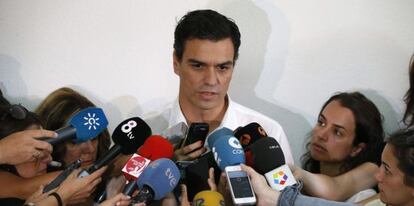Pedro Sánchez Castejón wins Socialist leadership race in first open vote
The virtual unknown is promising to take the party “as far to the left as its grassroots voters”

Pedro Sánchez Castejón, a virtually unknown figure to the public, has become the new leader of the Socialist Party (PSOE) and the man who will run in general elections next year to try to wrest power from the Popular Party (PP) conservatives.
A 42-year-old deputy in congress with a PhD in economics, Sánchez was elected new secretary general on Sunday in primaries where all card-carrying members of the Socialist party were allowed to vote directly for the first time in party history. The move reflects insistent calls for greater transparency and internal democracy in the wake of the rise of smaller left-wing parties such as Podemos, which is threatening to take votes away from the PSOE.
Sánchez will replace Alfredo Pérez Rubalcaba, a veteran party leader who decided to step down in the wake of the Socialist Party’s poor showing at European elections on May 25. Rubalcaba, who also lost the 2011 general elections to Mariano Rajoy, had called an extraordinary party meeting for July to elect a replacement.
People who know Sánchez well say ambition is his chief trait, and that he always makes the most of opportunities
The winner took 48.7 percent of the vote, compared with 36.14 percent for his main rival Eduardo Madina and 15.13 percent for José Antonio Pérez Tapias. Turnout was high at 67 percent, reflecting grassroots enthusiasm for the chance to express an opinion on their own party leaders.
Sánchez’s first pledge following his victory was to create a leadership “as far to the left as its grassroots voters,” while shying away “from populism and demagoguery,” in what seemed like a veiled reference to Podemos.
The new party secretary said he wants to change the PSOE “to change Spain” and announced “the beginning of the end of Rajoy.”
The Socialist party has been stuck in a rut for the last two-and-a-half years, losing election after election at the local, regional and national level. While the implosion took place in November 2011, when voters punished the party for its perceived mismanagement of the economic crisis under José Luis Rodríguez Zapatero, the Socialists have not managed to gain back lost ground in any significant manner since then.
Some party sectors have been talking about the need for a complete overhaul that should include a younger leadership, new internal rules and a return to the PSOE’s foundational values. This is what Sánchez was referring to when he talked about “restoring the [party’s] signs of identity.”
Some party sectors have been talking about the need for a complete overhaul, including younger leadership
Eight months ago, Pedro Sánchez began talking to Socialist leaders to see whether he might be able to make a run for party secretary in the next primaries. It was hard to predict then that he would go on to beat Madina, a candidate with a much higher public profile than his own. He was the most-voted contender in the regions of Andalusia, the Basque Country (where Madina is from), Valencia, Madrid, Galicia, Aragón, Castilla-La Mancha, Baleares, La Rioja, Canarias, Murcia and Melilla.
Sánchez has offered Madina and Pérez Tapias a position in his new executive, although neither one has made a final decision yet.
The people who know Sánchez well say that ambition is his chief trait, and that he is very adept at taking advantage of the opportunities that come his way. He was a Madrid councilor between 2004 and 2009 and a member of Congress between 2009 and 2011 and again since 2013, but always by chance, because the person ahead of him on the party list had renounced the position.
Someone who knows the PSOE well said that Sánchez “is the bicycle that [former Socialist minister] José Blanco included in the race under a year ago, faithful to his habit of always including a bicycle even in a Formula 1 race, because if all the cars crash his bicycle will still be there.”
Tu suscripción se está usando en otro dispositivo
¿Quieres añadir otro usuario a tu suscripción?
Si continúas leyendo en este dispositivo, no se podrá leer en el otro.
FlechaTu suscripción se está usando en otro dispositivo y solo puedes acceder a EL PAÍS desde un dispositivo a la vez.
Si quieres compartir tu cuenta, cambia tu suscripción a la modalidad Premium, así podrás añadir otro usuario. Cada uno accederá con su propia cuenta de email, lo que os permitirá personalizar vuestra experiencia en EL PAÍS.
¿Tienes una suscripción de empresa? Accede aquí para contratar más cuentas.
En el caso de no saber quién está usando tu cuenta, te recomendamos cambiar tu contraseña aquí.
Si decides continuar compartiendo tu cuenta, este mensaje se mostrará en tu dispositivo y en el de la otra persona que está usando tu cuenta de forma indefinida, afectando a tu experiencia de lectura. Puedes consultar aquí los términos y condiciones de la suscripción digital.








































